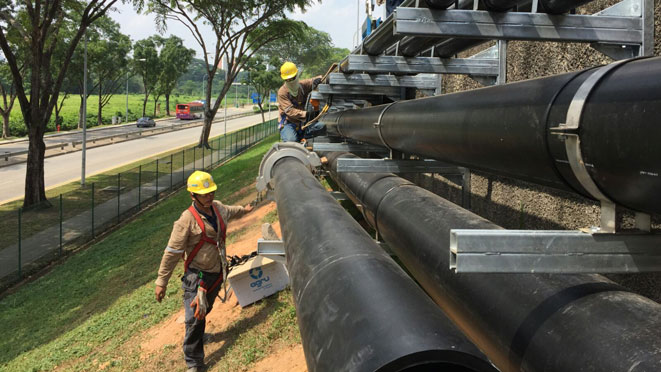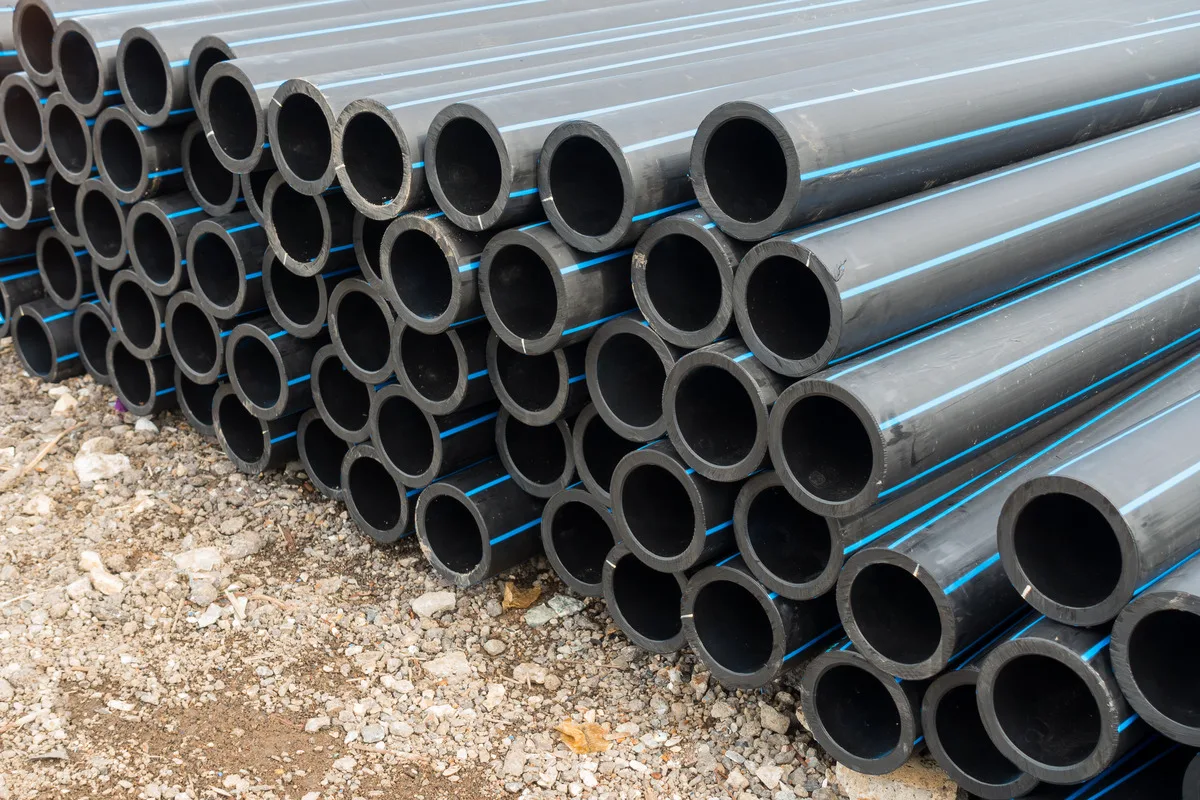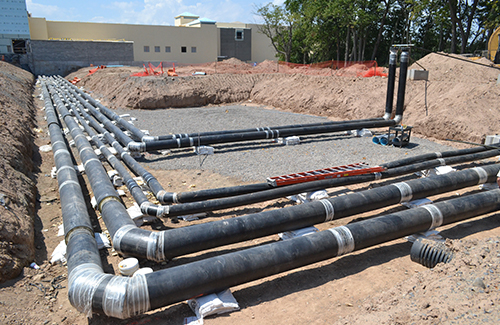Exploring the Leading Pipeline Manufacturers: Quality, Integrity, and Technology
The pipeline manufacturing sector stands at the intersection of quality, advancement, and integrity, driven by leading firms such as Tenaris and Vallourec. These suppliers are not just dedicated to generating high-performance products however are additionally introducing lasting methods that address contemporary environmental worries (HDPE Pipe Supplier). As we check out the requirements that define quality in pipeline options, it becomes evident that the landscape is quickly evolving. What specific developments are emerging, and exactly how are these developments forming the future of pipeline infrastructure? The answers may redefine sector standards in methods that are not yet completely understood
Leading Manufacturers Review
In the domain of pipeline manufacturing, several vital players emerge as leaders, each adding considerably to the industry's landscape. Companies such as Tenaris, Vallourec, and JFE Steel have established themselves as frontrunners by consistently providing high-quality products that satisfy strict market criteria. Tenaris, renowned for its cutting-edge solutions, focuses on smooth and bonded pipelines, catering mostly to the oil and gas field. Vallourec, a French multinational, concentrates on the manufacturing of costs tubular options, emphasizing sustainability and advanced modern technology in its manufacturing processes.
JFE Steel, a major Japanese manufacturer, is acknowledged for its considerable variety of steel pipes, particularly those used in energy and infrastructure tasks. Their commitment to research study and development has actually enabled them to create high-performance products that withstand extreme ecological problems. Furthermore, firms like united state Steel and National Oilwell Varco have broadened their market visibility by expanding their product offerings and improving functional performances.
These leading manufacturers not just control the market however likewise drive innovation within the industry, establishing criteria for quality and integrity that various other players strive to accomplish. Their contributions are vital for meeting the raising demand for durable and effective pipeline solutions worldwide.
Standards for Top Quality Assessment
Quality analysis in pipeline manufacturing rests on 2 important criteria: product toughness criteria and making procedure performance. Making certain that materials satisfy rigorous durability benchmarks is necessary for the durability and integrity of pipes. Additionally, enhancing the manufacturing process can boost efficiency while keeping excellent quality, inevitably influencing total efficiency and safety.
Material Resilience Requirements
Ensuring the long life and dependability of pipeline products is important for keeping infrastructure integrity and operational effectiveness. Product toughness criteria play an important function in reviewing the top quality of pipelines, determining the performance and lifespan of the products used in building and construction. Manufacturers must comply with a variety of rigorous requirements, including those set by organizations such as ASTM International and the American Petroleum Institute (API)
These criteria review different variables, including deterioration resistance, tensile strength, and fatigue performance. For instance, pipelines used in harsh settings call for materials that can stand up to chemical deterioration, while those based on high-pressure problems need to exhibit outstanding tensile strength.
Furthermore, variables such as temperature fluctuations and ecological conditions should be considered, as these can substantially affect product actions in time. Manufacturers frequently utilize sophisticated screening techniques, including accelerated aging tests, to simulate long-term wear and warranty that materials surpass or fulfill industry standards.
Manufacturing Process Efficiency
Manufacturers' capacity to maximize manufacturing process performance is important for creating high-quality pipelines that fulfill strict market criteria. Effectiveness in making straight affects expense monitoring, manufacturing timelines, and general item integrity. To accomplish this, leading pipeline suppliers apply sophisticated techniques such as lean manufacturing, automation, and real-time information analytics.
Lean producing principles are important in lessening waste and maximizing source utilization. By enhancing processes and eliminating redundancies, producers can enhance productivity while making sure consistent high quality. Automation innovations, including robotics and computer numerical control (CNC) equipments, play a critical role in enhancing precision and reducing human error, therefore elevating the reliability of the end product.
Furthermore, the use of real-time data analytics permits producers to check production procedures continually, allowing them to recognize bottlenecks and make timely adjustments. This proactive method not only improves performance but also sustains quality control methods by making sure compliance with governing requirements.
Integrity in Pipeline Solutions
Integrity in pipeline solutions is critical, as it directly influences the safety and performance of fluid transport systems. Trick elements consist of the durability of materials used, adherence to rigorous testing and qualification criteria, and the unification of cutting-edge product services that enhance performance. Comprehending these elements is vital for suppliers aiming to provide dependable pipeline framework.
Value of Durability
Attaining toughness in pipeline solutions is crucial, as it directly influences the long-term performance and safety of facilities. Sturdy pipes are essential for lessening upkeep expenses and minimizing the possibility of catastrophic failures. This dependability is particularly important in sectors such as oil and gas, supply of water, and wastewater management, where the effects of pipeline failing can be extreme, both economically and environmentally.
The materials and producing procedures employed by pipeline manufacturers play a substantial role in establishing the toughness of the final item. Making use of top quality resources, advanced technologies, and cutting-edge style concepts ensures that pipes can endure different stress factors, consisting of pressure changes, temperature level variations, and corrosive atmospheres.
The longevity of pipes is very closely connected to their capability to resist exterior aspects such as soil motion, seismic task, and chemical exposures. Reliable deterioration protection techniques, such as coverings and cathodic protection, better boost the durability of pipelines, safeguarding them versus wear and tear in time.
Spending in resilient pipeline services inevitably converts to raised operational efficiency, lowered downtime, and boosted safety and security, attesting the critical value of toughness in contemporary pipeline manufacturing.
Examining and Accreditation Standards
In the domain of pipeline options, extensive screening and certification requirements are crucial to ensure the reliability and safety of infrastructure. These criteria function as standards for reviewing the performance and longevity of pipeline products and systems, validating they meet certain regulative and industry needs.
Testing processes usually encompass numerous methods, including pressure screening, hydrostatic evaluations, and non-destructive screening strategies. These evaluations are crucial for recognizing potential weak points or issues in the materials before they are deployed in real-world applications. In addition, accreditation by recognized organizations assurances that makers comply with developed standards, which fosters depend on amongst stakeholders, including designers, end-users, and specialists.
Lots of leading pipeline makers take part in constant monitoring and enhancement of their screening procedures to adapt to progressing industry criteria and technical innovations. Compliance with standards such as ASTM, ASME, and ISO not just boosts product integrity yet also lessens the danger of environmental cases associated with pipeline failings.
Ingenious Material Solutions
The advancement of ingenious material services has actually changed the landscape of pipeline manufacturing, boosting both performance and toughness. Advanced products such as high-density polyethylene (HDPE), cross-linked polyethylene (PEX), and composite products have actually become game-changers, supplying exceptional resistance to rust, temperature level variations, and pressure variations. These materials not just prolong the life-span of pipes but likewise minimize maintenance prices, making certain reliable long-lasting performance.
Moreover, suppliers are increasingly adopting smart products that incorporate sensors for real-time surveillance. This modern technology enables positive maintenance, read significantly enhancing integrity by detecting leaks or architectural weak points prior to they intensify right into critical failures. The combination of nanotechnology has actually additionally caused the advancement of coverings that boost the resilience of pipes against abrasion and chemical direct exposure.
Sustainability is one more crucial focus, with manufacturers discovering bio-based composites and recyclable products that minimize ecological influence. As governing standards remain to progress, the emphasis on ingenious product services becomes paramount in meeting rigorous safety and security and ecological demands. Inevitably, these innovations not just boost the dependability of pipeline systems yet additionally add to the general efficiency and sustainability of power transport infrastructures.
Advancements in Pipeline Innovation
Developments in pipeline modern technology are changing the sector by improving effectiveness, safety and security, and ecological sustainability. Recent developments focus on clever pipeline systems that use sensors and IoT technology to check problems in real time, making it possible for positive upkeep and minimizing the threat of failings. These systems can discover leaks, pressure adjustments, and various other abnormalities, enabling quick response and lessening ecological influence.
In addition, the development of advanced products, such as composite and corrosion-resistant alloys, substantially expands the lifespan and integrity of pipes. HDPE Pipe Supplier (American Plastics LLC HDPE Pipeline Manufacturer). These materials reduce maintenance prices and boost efficiency in severe atmospheres, making them perfect for water, oil, and gas transport
Furthermore, automation and robotics are playing a vital role in pipeline construction and inspection. Drones and robotic gadgets help with surveys and evaluations of hard-to-reach areas, guaranteeing extensive assessments without jeopardizing safety and security.
Cutting-edge layouts, such as modular pipeline systems, permit for better flexibility in setup and adjustment, catering to the vibrant demands of the energy market. With each other, these technological innovations not just boost operational performance but likewise contribute to a more sustainable and resistant pipeline framework, paving the method for a greener future.
Situation Research Studies of Success
Throughout different fields, effective implementations of sophisticated pipeline modern technologies demonstrate substantial enhancements in functional effectiveness and safety. One remarkable situation is the deployment of wise pipeline monitoring systems in the oil and gas market, where real-time data analytics have actually decreased leak discovery times by over 50%. This not just decreases environmental risks however additionally boosts the overall integrity of pipeline facilities.

Furthermore, a significant manufacturer applied robot assessment technologies in its pipeline maintenance operations, causing a 40% renovation in examination performance. This strategy has structured upkeep timetables and substantially decreased downtime.
These instance researches highlight how leading pipeline manufacturers are leveraging cutting-edge modern technologies to foster integrity and functional quality, inevitably setting brand-new standards for the sector. As these successes proceed to unfold, they lead the way for additional developments in pipeline manufacturing and monitoring.

Environmental Sustainability Practices
Often, pipeline suppliers are prioritizing environmental sustainability methods to minimize their ecological footprint and improve the long life of their products. This commitment is shown in various efforts intended at lowering waste, conserving energy, and using lasting materials throughout the manufacturing process.

Numerous suppliers are taking on advanced innovations that lessen exhausts and energy intake. For circumstances, the integration of automated systems and energy-efficient equipment aids enhance manufacturing while reducing reliance on nonrenewable fuel sources. Additionally, firms are significantly transforming to environment-friendly materials, such as recycled metals and bioplastics, which not just lower the ecological effect but also advertise a round economic climate.
Pipeline makers are executing extensive lifecycle evaluations to review the environmental ramifications of their products from beginning to disposal. This strategy enables them to recognize possibilities for enhancement and foster responsible sourcing and waste management techniques.
Partnership with environmental organizations additionally boosts these initiatives, as manufacturers look for to straighten their procedures with worldwide sustainability goals. Inevitably, these ecological sustainability practices not just add to a healthier earth however also position makers as liable leaders in the industry, interesting ecologically mindful stakeholders and customers alike.
Future Patterns in Pipeline Manufacturing
As the need for more sustainable and reliable infrastructure grows, pipeline manufacturing is positioned for significant improvements that will certainly reshape the industry. Key patterns prepared for in the coming years include the combination of innovative materials, such as composite and corrosion-resistant alloys, which boost resilience while lessening ecological impact. Manufacturers are likewise anticipated to take on cutting-edge production techniques, like additive manufacturing and automation, to simplify processes, decrease waste, and reduced costs.
Moreover, the increase of smart pipeline innovations, integrating sensing units and IoT devices, will allow real-time tracking and anticipating upkeep, thus enhancing safety and security and functional performance. This electronic improvement will not only optimize resource monitoring but also facilitate conformity with rigorous ecological policies.
Sustainability will remain a main focus, driving makers to buy eco-friendly techniques, consisting of energy-efficient production methods and reusing efforts. As the worldwide emphasis on environment adjustment escalates, pipeline suppliers will certainly need to adapt by creating remedies that fulfill both environmental and financial needs.
Frequently Asked Inquiries

What Industries Mainly Make Use Of Pipeline Products From These Manufacturers?
Pipeline items are mostly utilized in sectors such as oil and water, gas and wastewater management, chemical construction, mining, and processing. These fields depend on effective, sturdy, and secure transportation of products and liquids.
How Do Manufacturers Guarantee Conformity With International Pipeline Requirements?
Manufacturers assure conformity with international pipeline requirements by carrying out strenuous quality control processes, conducting regular evaluations, adhering to well-known regulatory frameworks, and buying employee training to promote awareness and understanding of safety and quality requirements.
What Is the Average Life-span of Pipelines From Leading Manufacturers?
The average life-span of pipes from leading suppliers typically varies from 30 to 100 years, relying on product, ecological problems, and upkeep techniques. American Plastics LLC HDPE Pipeline Manufacturer. Routine assessments and adherence to industry criteria considerably influence durability and performance
Are There Certifications Details to Pipeline Production High Quality?
Yes, various qualifications exist for pipeline producing quality, including ISO 9001 for high quality monitoring systems and API standards specific to pipes. These qualifications ensure adherence to rigorous safety and security, performance, and environmental criteria within the market.
How Do Manufacturers Take Care Of Pipeline Maintenance and Repairs?
Manufacturers commonly execute a proactive upkeep technique that includes routine inspections, monitoring systems for very early discovery of problems, and an organized fixing method. This method warranties pipeline integrity, decreases downtime, and enhances total operational effectiveness.
Quality analysis in pipeline manufacturing hinges on two essential requirements: product resilience standards and producing procedure efficiency - Pipeline Manufacturer. Product longevity criteria play an important duty in examining the high quality of pipes, dictating the performance and life-span of the products used in building and construction. The products and producing procedures used by pipeline manufacturers play a considerable function in establishing the resilience of the final product. The typical life expectancy of pipes from leading suppliers typically varies from 30 to 100 years, depending on material, ecological problems, and upkeep methods. Yes, various accreditations exist for pipeline producing top quality, consisting of ISO 9001 for top quality monitoring systems and API criteria specific to pipelines